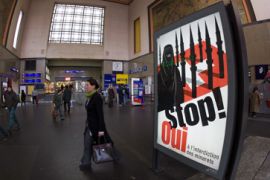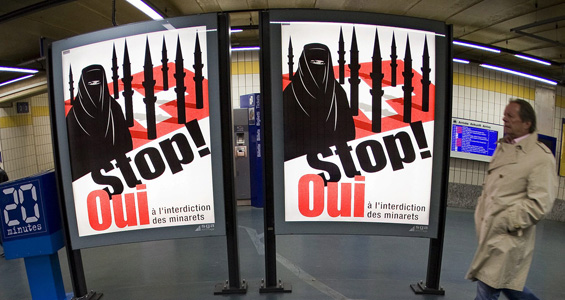Behind the Swiss minaret vote
Al Jazeera asks whether deeper issues are at stake in Switzerland’s referendum.

 |
|
The right wing Swiss People’s Party says that minarets are political symobols [EPA] |
Down in the little town of Waggen Bei Olten, about a 30 minute drive from the Swiss capital of Bern sits a rare landmark. In this unremarkable town next to the railway tracks, stands one of only four mosques in Switzerland with a minaret.
It’s been there for eleven months. It took four years of negotiating the country, the area and the commune’s tough planning laws before it was given permission. Now it sits, its blue spire pushing into the sky, almost cartoon-like in the way it’s been added to the building.
Swiss voters are deciding in a referendum whether to ban minarets in the country. If right wing parties in Switzerland have their way, no more will be built. This, they say, is the beginning of Switzerland’s fight against Islamification.
Mustapha Karahan is the mosque president. He’s lived in Switzerland for 30 years, and when he came here from Turkey, he brought his religion with him.
Small, well-dressed and unfailing polite, he worries about the referendum, and what it means for the country’s Muslim minority: “When there is such a provocation, that hurts us and disturbs us. This provokes public opinion. Four times in two years, our windows have been smashed. They attack us, they threw red wine at the mosque and they put a pig’s head on the steps.”
He, of course, has no vote. He’s not a Swiss citizen.
Controversial campaign material
According to the official pamphlet sent out to registered voters, there are around 160 mosques and cultural centres in Switzerland.
Very few have applied to have a minaret, but the issue has been seized upon by the right-wing Swiss People’s Party, who are leading the “No” campaign. They see minarets not as a religious symbol but as a political one.
|
“Soon they will want the introduction of Sharia law.” Ulrich Schuler, Swiss MP and a leader of anti-minaret campaign |
“It’s a symbol against integration,” I’m told by Ulrich Schuler, a Swiss MP and one of the leaders of the anti-minaret campaign.
“It starts with minarets, then the power grows and soon they will want the introduction of Sharia law”.
I ask if his campaign cloaks a racist message, that Muslims aren’t wanted in Switzerland.
“We have the highest immigration of any European country, but have an open democracy and it’s important these things are discussed openly, freely and with no violence”.
Despite opinion polls suggesting the proposal for a ban will fail, he believes it will be “very, very close”.
To push home their message, the People’s Party have produced a controversial poster which shows a woman in traditional burkha standing beside a Swiss flag pierced by minarets which look like rockets.
This follows on from their campaign on nationality almost two years ago, which included a poster in which a black sheep was portrayed being kicked off the Swiss flag by the white ones.
Opponents said that this message was blatantly racist, playing on people’s fears. Some towns and cities banned the poster, others allowed it saying they would not restrict free speech.
‘Small minded’
Saturday in Bern’s central railway station is very busy. Perhaps busier than normal, because a polling station has been set-up here for the local community. In one corner of a waiting room, they cast their ballots.
Most voting here is done by post, so many people have made their decision. One man tells me he hopes the proposal is rejected because approval will damage Switzerland’s international standing.
A young woman believes it’s “small minded”, but one older man says he’s glad of the chance to vote because “In Switzerland, we are very concerned about the Muslims”.
To pass, the proposal must win the support of the majority of Switzerland’s 26 cantons or areas, and a majority of the people voting.
The odds are stacked against it, which will be a relief to the central government and many Swiss companies who fear an international backlash from their Muslim customers.
But this is far from being a simple argument and vote about construction and building of minarets. This referendum has exposed deep divisions in a country often regarded as the most stable in Europe.
The referendum may have been decided this weekend, but debate about the role of Islam in Switzerland has just begun.